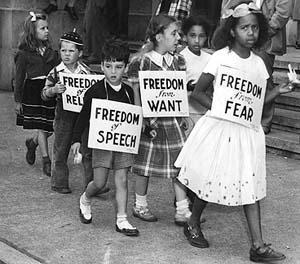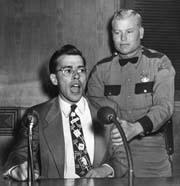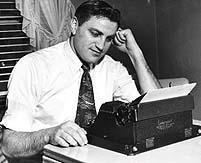By Sharon Boswell
and Lorraine McConaghy
Special to The Times
 |
Children protested the Canwell Committee's UW hearings at the Seattle Armory in 1948. The "Four Freedoms" on their signs referred to the basic rights of mankind, outlined by President Franklin Roosevelt, that became the Allied rallying cry of World War II. Photo Credit: Vic Condiotty / Seattle Times. |
BY MID-CENTURY, WASHINGTON'S LONG ACTIVIST TRADITION -- Populists
to Wobblies to the Unemployed Citizens League -- prompted Postmaster General James Farley's famous quip about
"the 47 states and the Soviet of Washington." Spurred by hard times, many Washington people had joined
organizations that promised to cure a sick society. Asked in 1954 who had drawn him to join
the Communist Party, Professor Abraham Keller of the University of Washington mused,
"I was recruited by the Depression."
But in the wake of the United States' "losses" of China,
its nuclear monopoly and its wartime primacy, only a conspiracy directed by a
ruthless enemy seemed to explain the Cold War "retreat from victory." Theatrical efforts
to ferret out the conspirators at home and track them back to Moscow held center stage in American politics.
In Washington state, the 1947 Legislature created the Un-American
Activities Committee, chaired by Rep. Albert Canwell, R-Spokane. Its purpose was to investigate
local Communist subversion and "seek facts upon which to base remedial legislation," as
a Seattle Times editorial put it. Canwell's initial hearings focused on the Washington Pension Union,
but the committee's real target was the UW.
State Sen. Thomas Bienz of Spokane charged that 150 Communists or
sympathizers taught at the UW in 1948. The Board of Regents president promised to recommend dismissal
of anyone "found by the Canwell Committee to be engaged in subversive activities."
The Committee opened its UW inquiry in Seattle on July 19,
1948. Reminding witnesses "this is a legislative hearing, not a trial," Canwell
insisted that rules of cross-examination and admissible evidence did not apply.
Accused of Communist activities by unchallenged testimony, some "witnesses"
refused to testify altogether, some admitted affiliation but refused to name
their associates, and some hotly denied party membership.

In July 1948, a state legislative committee set out to see how far Communism
had infiltrated the UW faculty. Any accused of violating their loyalty oaths as state
employees risked loss of their positions.
At left, UW veterans' counselor Ted Astley angrily refused to answer questions,
was ejected from the hearing and later fired. Photo Credit: Seattle Times.
GEORGE HEWITT, A FORMER COMMUNIST, ACCUSED UW PHILOSOPHY PROFESSOR MELVIN RADER
of attending a 1938 "secret school of professionals" open only to high-ranking Communist academics.
Rader declared, "I have always been a liberal. I have never been a member of the Communist Party,"
and flatly denied Hewitt's accusation. But when the hearings concluded, the charges were neither
proved nor disproved, and Rader remained under suspicion.
More than a year later, Canwell, Rader and UW President Raymond Allen
met to review evidence -- meticulously researched by Seattle Times reporter Ed Guthman
-- of Rader's whereabouts in 1938.
Small things -- cabin rental, pay stubs, library books, a toothache --
left a paper trail for persistence to discover. Guthman won the 1950 Pulitzer Prize for national
reporting, honoring his series of Times stories that helped to clear Rader.

At right, Seattle Times reporter Ed Guthman. Photo Credit: Seattle Times.
CANWELL, HOWEVER, REMAINED UNCONVINCED AND MADE NO APOLOGIES.
Four years later, in April 1953, trial opened in U.S. District Court in Seattle
for seven people charged with conspiring to overthrow the government by force -- a
violation of the Smith Act. The defendants were Henry Huff, state chairman of the Communist
Party; William Pennock, president of the Washington Pension Union; Terry Pettus, Pacific Northwest
editor of The People's World newspaper; Paul Bowen, former party organizer in Seattle; John Daschbach,
chairman of the State Civil Rights Congress; Karly Larsen, local official of the
International Woodworkers of America; and Barbara Hartle, described by the FBI as
"Washington's top woman Communist."
Except for Larsen, the defendants "proudly affirmed" their party membership.
Pettus and Daschbach were cited for contempt after their testimony.
Pennock died during the trial. His death was ruled a suicide, though his attorney and friends
maintained it was an accidental overdose of sleeping tablets.
Larsen was acquitted; the remaining five were found guilty and sentenced to five years.
A strike kept The Times from publishing during most of the Smith Act trial, but
the newspaper did send the stellar reporting team of Guthman, Dwight Schear and Georg Meyers to cover the
1954 U.S. House Un-American Activities Committee hearings in Seattle. While Sen. Joseph McCarthy hunted for Reds in Washington, D.C., U.S. Rep. Harold Velde, R-Ill., hunted them here.
Barbara Hartle was Velde's star witness. Surrounded by television cameras and radio
microphones, she named names, describing the Communist involvement of more than 300 Washington residents.
Those she accused sneered at the "inventive genius" of this "stool pigeon" who was
bargaining down her Smith Act prison term.
After six days of hearings, Velde flew on to Portland, convinced of
"widespread Communist infiltration into almost every activity in this area."
The Canwell Committee, the Smith Act trial and the Velde Committee proved
that there were Reds in the state. But anti-Communist hysteria confused hearsay with evidence,
association with conspiracy and innuendo with indictment. In this repressive atmosphere,
the Northwest's inheritance of progressivism and labor militancy was discredited, and all
forms of dissent threatened. To protect national security, the Cold War home front was haunted
by disregard for constitutional rights, due process of law and common civility.
Historians Sharon Boswell and Lorraine McConaghy teach at local universities and do research,
writing and oral history. Original newspaper graphics courtesy of the Seattle Public Library.